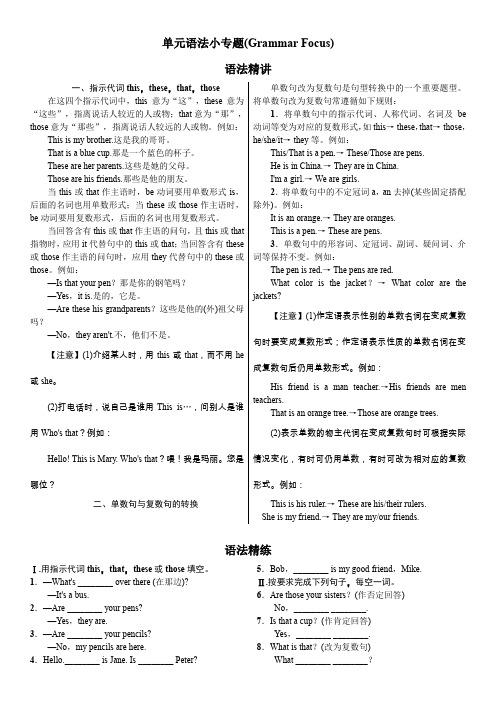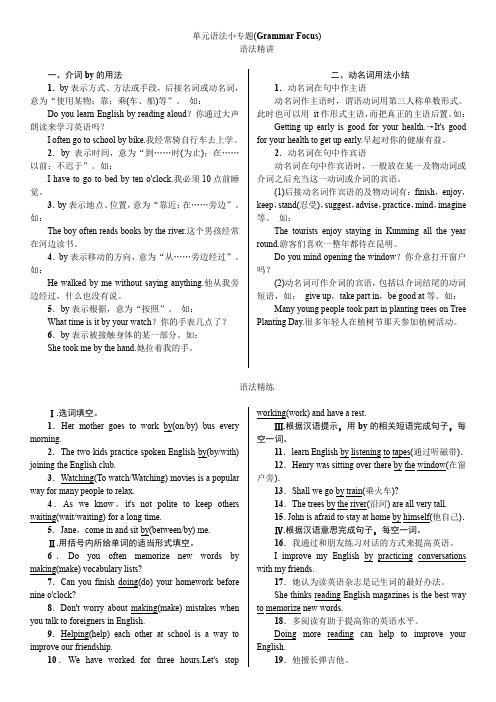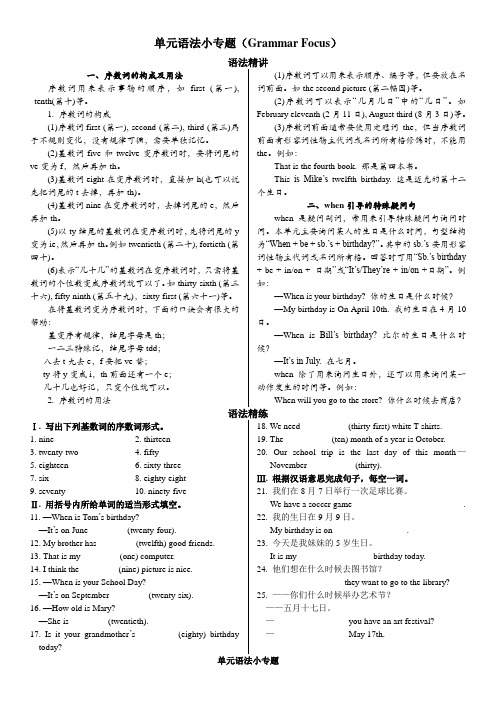单元语法小专题 133
Unit+2+单元语法精讲与精练+单元写作小专题课件-2023-2024学年人教版英语八年级上册

单元语法知识精讲 频度副词的用法
1.频度副词的含义 (1)表示次数、频率的副词称为频度副词。常用的频度副词按频率发生的 高 低 依 次 为 : always(100%)>usually(80%)> sometimes(60%)> seldom(30%)> hardly ever(10%)> never(0%)。 (2)表示具体的频率、次数时,一次用 once,两次用 twice,三次或三次以 上用“基数词+times”表示:three times,four times,six times 等。
ห้องสมุดไป่ตู้
热点写作演练 假设你是李华,请给你的美国笔友 Tom 写一封信,谈谈你的课余时间参 加课外活动的情况。 内容包括: 1.介绍你们学校开展的课外活动; 2.叙述你的一次课外 活动经历; 3.说说你的体会。
要求:1.语言通顺,意思连贯,书写规范;2.80 词左右。书信开头 和结尾已给出,不计入总词数。
Dear Tom, How's it going?Let me tell you something about our after-school
activities.
WWeehahvaevelotlostsofoaf ftaeftrers-scchhooooll aaccttiiviittieisesininoouurr sscchhooooll ffoorr ouurr ffrreee ttiimmee..TThheerreeaarereovoevre2r02s0tusdteundtesn'tcslu'bcsliunbosuirnscohuorosl.cThhoeorle.aTrheearret acrluebasr,t cblauskbest,bablal sckluebtbs,alml ucslicubcslu,bmsuasnidc scolounbs.I aonftdensoexoernc.iIseoifntmeny efrxeeerctiimse iandmyI farmeeintitmhee abnadskIetabmalilnatnhde cbhaessksectlbuablsl.Waendofctheensshacvleubas.bWaeskoeftbtaelnl hmaavtechaonbaFsrkiedtabya.AllftemraetvcehryongaFmrei,dawy.eAafrteevrereyvetirryedgbamuet ,exwceiteadr.We hvaetr'ys tmiorreed, bIutalesoxcpiltaeyd.cWhheasts'ws imtohrem,yI callassompaltaeys cthhersees wtiimthesmya cwlaeesksmaftteesr tschhroeoel.times a w
人教版七年级英语上册Unit 2同步练习题及答案单元语法小专题(Grammar Focus)

单元语法小专题(Grammar Focus)语法精讲一、指示代词this,these,that,those在这四个指示代词中,this意为“这”,these意为“这些”,指离说话人较近的人或物;that意为“那”,those意为“那些”,指离说话人较远的人或物。
例如:This is my brother.这是我的哥哥。
That is a blue cup.那是一个蓝色的杯子。
These are her parents.这些是她的父母。
Those are his friends.那些是他的朋友。
当this或that作主语时,be动词要用单数形式is,后面的名词也用单数形式;当these或those作主语时,be动词要用复数形式,后面的名词也用复数形式。
当回答含有this或that作主语的问句,且this或that 指物时,应用it代替句中的this或that;当回答含有these 或those作主语的问句时,应用they代替句中的these或those。
例如:—Is that your pen?那是你的钢笔吗?—Yes,it is.是的,它是。
—Are these his grandparents?这些是他的(外)祖父母吗?—No,they aren't.不,他们不是。
【注意】(1)介绍某人时,用this或that,而不用he 或she。
(2)打电话时,说自己是谁用This is…,问别人是谁用Who's that?例如:Hello! This is Mary. Who's that?喂!我是玛丽。
您是哪位?二、单数句与复数句的转换单数句改为复数句是句型转换中的一个重要题型。
将单数句改为复数句常遵循如下规则:1.将单数句中的指示代词、人称代词、名词及be 动词等变为对应的复数形式,如this→ these,that→ those,he/she/it→ they等。
例如:This/That is a pen.→ These/Those are pens.He is in China.→ They are in China.I'm a girl.→ We are girls.2.将单数句中的不定冠词a,an去掉(某些固定搭配除外)。
人教版七年级英语上册:Unit4 单元语法小专题【练习】

单元语法小专题(Grammar Focus~3c),01语法精讲一、方位介词的用法英语中,当要表示某人或某物在某地时,通常要借助于方位介词。
方位介词不能单独充当句子成分,必须与其他词或短语构成介词短语放在be动词或其他动词后面作表语或状语等,也可放在名词后作定语。
下面我们来看一下本单元学到的三个方位介词。
1.on意为“在……上”,表示一个物体在另一个物体的表面上。
例如:The book is on the desk.那本书在书桌上。
2.in意为“在……里”,表示一个物体在另一个物体的内部。
例如:The dictionary is in the schoolbag.字典在书包里。
3.under意为“在……下”,表示一个物体在另一个物体的正下方,但两个物体并不接触。
例如:Is the baseball under the chair?棒球在椅子下面吗?二、where引导的特殊疑问句1.用法where是疑问副词,意为“在哪里;到哪里”,用来引导特殊疑问句。
常用句型“Where is+单数名词/代词?”或“Where are+复数名词/代词?”询问人或物所在的位置。
例如:Where is my eraser?我的橡皮在哪里?Where is she?她在哪儿?Where are the keys?钥匙在哪里?Where are they?他们在哪儿?2.答语(1)用It's…(对应Where is…?)或They're…(对应Where are…?)作答。
例如:—Where is my eraser?我的橡皮在哪里?—It's in your pencil box.它在你的铅笔盒里。
—Where are the keys?钥匙在哪里?—They're under the bed.它们在床下面。
(2)直接说出物品所在地点,省略it's或they're。
例如:—Where's the clock?时钟在哪里?—On the wall.在墙上。
专题13 重点语法情态动词can的用法(知识点全覆盖)-七年级英语下(人教版)

人教版七年级下学期期中复习查缺补漏冲刺满分(单元重点语法)专题13 重点语法情态动词can的用法一、单项选择1.—Can your parents sing and dance?—________. And they do them very well.A.Yes, they do B.No, they don’t C.No, they can’t D.Yes, they can 2.—Hi! Can you play ping-pong?—________.A.Yes, I am B.No, I can’t C.Yes, I can’t3.—Can he go to Sanya with us?—No, he ________. His father is in hospital.A.can’t B.isn’t C.doesn’t4.You ________ watch TV, but you have to clean the room first.A.must B.can C.can’t5.—May I use your bike, Jack?—Of course you ________. I don’t use it.A.must B.mustn’t C.can D.can’t6.I moved to a new flat and it’s close to my office. Now I ________ walk to work instead of going by car.A.should B.must C.can D.need7.— Wang Hui, you must finish your homework first, or you ______ watch TV.— OK, Mom.A.couldn’t B.needn’t C.can’t8.—Can I take the book out of the reading room?—No, you ________. You ________ read it here. It’s the rule.A.can; must B.don’t have to; mustC.can’t; have to D.mustn’t; can9.—Can I listen to music in class?—________. But you can listen to music in the hallways.A.Yes, you do B.No, you don’t C.Yes, you can D.No, you can’t10.—Look at Sylvia, her performance is really funny.—Yes, she can stand on her head, but she ________ walk on her hands.A.can B.can’t C.like D.don’t like 11.—Can you play chess?—________. I think it’s easy.A.Yes, I do B.No, I don’tC.Yes, I can D.No, I can’t12.Cars, buses and bikes ________ stop when the traffic lights change to red.A.can B.may C.must D.need13.My grandma ________ read or write. She didn’t go to school when she was young. A.can B.must C.can’t14.I need to have my glasses because I ________ see the blackboard.A.must B.mustn’t C.can D.can’t 15.Could you please speak a little louder? I ________ hear you very well.A.can’t B.mustn’t C.should’t D.needn’t 16.— Mom, ________ I play computer games this evening?— Sure, but you ________ finish your homework first.A.can; must B.can; mustn’t C.may; could D.may; can’t 17.— Listen! Is that Linda playing the piano in the room?— No. It ________ be Linda. She is in London these days.A.may not B.needn’t C.can’t D.mustn’t 18.—Can I use your pen, Mr. Smith?—Of course, you ________.A.can B.must C.may D.need 19.— This robot is great.— Wow, it has video cameras in its eyes, so it ________ “see” and interact(交流)with people. A.may B.can C.must D.should20.I ________ ride a bike, but I ________ drive a car.A.can, can B.can’t, can’t C.can, can’t 21.—Must I wash my clothes today?—I’m afraid you ________. You should learn to do something by yourself.A.need B.have to C.can D.could22.— Can you play volleyball every week?— ________. We play it on Wednesdays and Sundays.A.Yes, we do B.No, we don’t C.No, we can’t D.Yes, we can 23.I _______ play tennis but I _______ play table tennis.A.can; can’t B.can; can C.can’t; can’t24.I _______ play tennis but I _______ play table tennis.A.can; can’t B.can; can C.can’t; can’t25.—________ you play _________ basketball?—No, I can’t.A.Do; the B.Can; the C.Can; /D.Are; / 26.—Lisa,________ you speak French?—Yes, but only a little.A.may B.can C.must D.should 27.At the age of five, Jeff ________ play the guitar very well.A.could B.can C.must D.should 28.Tom can’t play basketball on school days, but he ________ play it on weekends. A.must B.can C.have to D.should 29.—Can John swim?— _________. But he can dance.A.Yes, he can B.No, he doesn’t C.Yes, he do D.No, he can’t 30.— Can Linda dance?— ________. But she can sing.A.Yes, she can B.No, she can’t C.Yes, she does D.No, she doesn’t 31.— Can Lily swim?— Yes, she ________.A.is B.can C.do D.does 32.—Jack, _________ you ride a bike?—Yes, I can.A.can B.may C.needn’t D.must 33.—Are the glasses Tim’s?—No, they _________ be his. He doesn’t wear glasses.A.must B.can C.mustn’t D.can’t 34.Why _________ he have a talk with her? _________ he do it tomorrow? A.may; May B.must; May C.can; Must D.can; Need 35.How _________ you be so busy?A.must B.need C.will D.can 36.—_________ you play football with us?—Sorry, I _________. I _________ tidy my room.A.Will; won’t; must B.Could; couldn’t; could C.Can; can’t; have to D.May; may not; must37.—_________ the exam paper be handed in right now?—No, it doesn’t have to. You may hand it in before 11:30.A.Can B.Must C.Should D.May 38.—Where is my umbrella?—It’s fine today. You _________ take an umbrella with you.A.can’t B.needn’t C.mustn’t D.shouldn’t 39.Henry _________ be at home because he telephoned me from Beijing just a moment ago.A.needn’t B.isn’t able to C.can’t D.does 40.—Listen! Is that Kate playing the piano in the room?—No. It _________ be Kate. She has gone to London.A.may not B.needn’t C.mustn’t D.can’t二、用所给单词的正确形式填空41.David can ________ (swim).42.His brother Tim can ________ (dance) very well.43.Listen! He can _________ (speak) much French.44.________(can)you help me out?45.I can't ________ (play) with you. I must do my homework.46.He can ____(play)the guitar on weekends.47.Can Bill ____(write)stories or tell stories?48.I can dance,but I ____(can )sing.49.Can you and Jane____ (join)the art club?50.Can your brother _____(play)the drums?三、完成句子51.–他们会舞龙吗?-不会。
人教版(河北专版)九年级英语上册练习 Unit 1 单元语法小专题

单元语法小专题(Grammar Focus)语法精讲一、介词by的用法1.by表示方式、方法或手段,后接名词或动名词,意为“使用某物;靠;乘(车、船)等”。
如:Do you learn English by reading aloud?你通过大声朗读来学习英语吗?I often go to school by bike.我经常骑自行车去上学。
2.by表示时间,意为“到……时(为止);在……以前;不迟于”。
如:I have to go to bed by ten o'clock.我必须10点前睡觉。
3.by表示地点、位置,意为“靠近;在……旁边”。
如:The boy often reads books by the river.这个男孩经常在河边读书。
4.by表示移动的方向,意为“从……旁边经过”。
如:He walked by me without saying anything.他从我旁边经过,什么也没有说。
5.by表示根据,意为“按照”。
如:What time is it by your watch?你的手表几点了?6.by表示被接触身体的某一部分。
如:She took me by the hand.她拉着我的手。
二、动名词用法小结1.动名词在句中作主语动名词作主语时,谓语动词用第三人称单数形式。
此时也可以用it作形式主语,而把真正的主语后置。
如:Getting up early is good for your health.→It's good for your health to get up early.早起对你的健康有益。
2.动名词在句中作宾语动名词在句中作宾语时,一般放在某一及物动词或介词之后充当这一动词或介词的宾语。
(1)后接动名词作宾语的及物动词有:finish,enjoy,keep,stand(忍受),suggest,advise,practice,mind,imagine 等。
2020年秋人教版八年级上册英语 unit 3单元语法小专题

单元语法小专题(Grammar Focus)语法精讲形容词、副词的比较级1.概念:英语中大多数形容词、副词有三个等级:原级、比较级和最高级。
两者比较用比较级;三者或三者以上相比用最高级。
比较的对象必须是属于同一性质或范畴的人或物。
【注意】比较的对象必须一致;比较的双方必须在同一范围内。
表示两者在某一方面相同时,用“as+形容词或副词原级+as”的句型。
如:I think science is as important as math.我认为科学和数学一样重要。
表示一方在某一方面不及另一方时,用“not as/so+形容词或副词原级+as”的句型。
如:It is not as/so warm today as yesterday.今天不如昨天暖和。
语法精练Ⅰ.用括号内所给单词的适当形式填空。
1.I think Sally did as ________(better) as Lucy in the math competition.2.Linda is much ________ (hard-working) than Anna.3.Who has ________ (many) books,Zhang Li or Li Ying?4.Do you think you are ________ (outgoing) than your father?5.It was cold yesterday,but it is much ________ (cold) today.6.This box is much ________(heavy),isn't it?7.Who is ________ (funny) than you in your class?8.I work ________(hard) this term,but David works even ________(hard).9.Which day was ________(hot),today or yesterday?10.This story is very ________(interesting),but that story is ________(interesting) than this one.Ⅱ.按要求完成下列句子,每空一词。
《名校课堂》八年级(上册)英语

湖北世纪华章文化传播有限公司公司简介湖北世纪华章文化传播有限公司创建于2001年,是一家以中小学教育辅导类图书开发为重点,集内容策划、出版发行于一体的民营股份制企业,是全国一流的基础教育图书供应商。
公司成功研发出版的《名校课堂》、《火线100天》等系列图书已经成为全国中小学教育类图书的一线品牌,每年有2000余万人次中小学生、98万余人次的教师、超过4.8万所学校使用本公司的图书,产品畅销不衰。
目前,公司拥有4项注册商标、一项国家专利,并与广西师范大学出版社、黑龙江教育出版社、北京市海淀区教师进修学校、黄冈市教育科学研究院等全国知名出版社、教育研发机构深度合作,重点研发教育类图书、报刊、网站等项目。
公司宗旨:服务教师、服务教学、服务教育公司使命:以图书出版推动教育进步公司愿景:让每一位学生以较小的成本分享到高品质的教育英语八年级(上册)Word 版习题导学案教学资源包Unit 1 Where did you go on vacation?Unit 2 How often do you exercise?Unit 3 I'm more outgoing than my sister.Unit 4 What's the best movie theater?Unit 5 Do you want to watch a game show? Unit 6 I'm going to study computer science. Unit 7 Will people have robots?Unit 8 How do you make a banana milk shake? Unit 9 Can you come to my party?Unit 10 If you go to the party, you'll have agreat time!Unit 1 Where did you go on vacation?第一课时单元语法小专题(Grammar Focus)第二课时话题阅读与交际第三课时第四课时单元重难点题组训练单元写作小专题&Section B(3a ~ 4)Self CheckTest for Unit 1Unit 2 How often do you exercise?第一课时单元语法小专题(Grammar Focus)第二课时话题阅读与交际第三课时第四课时单元重难点题组训练单元写作小专题&Section B(3a ~ 4)Self CheckTest for Unit 2Unit 3 I'm more outgoing than my sister.第一课时单元语法小专题(Grammar Focus)第二课时话题阅读与交际第三课时第四课时单元重难点题组训练单元写作小专题&Section B(3a ~ 4)Self CheckTest for Unit 3Unit 4 What's the best movie theater?第一课时单元语法小专题(Grammar Focus)第二课时话题阅读与交际第三课时第四课时单元重难点题组训练单元写作小专题&Section B(3a ~ 4)Self CheckTest for Unit 4Unit 5 Do you want to watch a game show?第一课时单元语法小专题(Grammar Focus)第二课时话题阅读与交际第三课时第四课时单元重难点题组训练单元写作小专题&Section B(3a ~ 4)Self CheckTest for Unit 5Unit 6 I'm going to study computer science.第一课时单元语法小专题(Grammar Focus)第二课时话题阅读与交际第三课时第四课时单元重难点题组训练单元写作小专题&Section B(3a ~ 4)Self CheckTest for Unit 6Unit 7 Will people have robots?第一课时单元语法小专题(Grammar Focus)第二课时话题阅读与交际第三课时第四课时单元重难点题组训练单元写作小专题&Section B(3a ~ 4)Self CheckTest for Unit 7Unit 8 How do you make a banana milk shake?第一课时单元语法小专题(Grammar Focus)第二课时话题阅读与交际第三课时第四课时单元重难点题组训练单元写作小专题&Section B(3a ~ 4)Self CheckTest for Unit 8Unit 9 Can you come to my party?第一课时单元语法小专题(Grammar Focus)第二课时话题阅读与交际第三课时第四课时单元重难点题组训练单元写作小专题&Section B(3a ~ 4)Self CheckTest for Unit 9Unit 10 If you go to the party, you'll have a great time!第一课时单元语法小专题(Grammar Focus)第二课时话题阅读与交际第三课时第四课时单元重难点题组训练单元写作小专题&Section B(3a ~ 4)Self CheckTest for Unit 10Unit 1 Where did you go on vacation?Unit 2 How often do you exercise?Unit 3 I'm more outgoing than my sister.Unit 4 What's the best movie theater?Unit 5 Do you want to watch a game show? Unit 6 I'm going to study computer science. Unit 7 Will people have robots?Unit 8 How do you make a banana milk shake? Unit 9 Can you come to my party?Unit 10 If you go to the party, you'll have agreat time!电子导学案第一课时第二课时第四课时第三课时导学案课件第一课时第二课时第四课时第三课时第五课时第五课时Unit 1 Where did you go on vacation?电子导学案第一课时第二课时第四课时第三课时导学案课件第一课时第二课时第四课时第三课时第五课时第五课时Unit 2 How often do you exercise?Unit 3 I'm more outgoing than my sister.电子导学案第一课时第二课时第四课时第三课时导学案课件第一课时第二课时第四课时第三课时第五课时第五课时Unit 4 What's the best movie theater?电子导学案第一课时第二课时第四课时第三课时导学案课件第一课时第二课时第四课时第三课时第五课时第五课时Unit 5 Do you want to watch a game show?电子导学案第一课时第二课时第四课时第三课时导学案课件第一课时第二课时第四课时第三课时第五课时第五课时Unit 6 I'm going to study computer science.电子导学案第一课时第二课时第四课时第三课时导学案课件第一课时第二课时第四课时第三课时第五课时第五课时第二课时Unit 7 Will people have robots?电子导学案第一课时第二课时第四课时第三课时导学案课件第一课时第四课时第三课时第五课时第五课时Unit 8 How do you make a banana milk shake?电子导学案第一课时第二课时第四课时第三课时导学案课件第一课时第二课时第四课时第三课时第五课时第五课时Unit 9 Can you come to my party?电子导学案第一课时第二课时第四课时第三课时导学案课件第一课时第二课时第四课时第三课时第五课时第五课时电子导学案第一课时第二课时第四课时第三课时导学案课件第一课时第二课时第四课时第三课时第五课时第五课时Unit 10 If you go to the party, you'll have agreat time!听力材料听力录音教学资源包8年级导学案教学资源包进入论坛Word 版习题优质课件。
人教版七年级上册英语单元语法小专题(grammarfocus)

单元语法小专题(Grammar Focus)语法精讲一、序数词的构成及用法序数词用来表示事物的顺序,如first (第一), tenth(第十)等。
1. 序数词的构成(1)序数词first (第一), second (第二), third (第三)属于不规则变化,没有规律可循,需要单独记忆。
(2)基数词five和twelve变序数词时,要将词尾的ve变为f,然后再加-th。
(3)基数词eight在变序数词时,直接加-h(也可以说先把词尾的t去掉,再加-th)。
(4)基数词nine在变序数词时,去掉词尾的e,然后再加-th。
(5)以-ty结尾的基数词在变序数词时,先将词尾的y 变为ie,然后再加-th。
例如twentieth (第二十), fortieth (第四十)。
(6)表示“几十几”的基数词在变序数词时,只需将基数词的个位数变成序数词就可以了。
如thirty-sixth (第三十六), fifty-ninth (第五十九),sixty-first (第六十一)等。
在将基数词变为序数词时,下面的口诀会有很大的帮助:基变序有规律,结尾字母是th;一二三特殊记,结尾字母tdd;八去t九去e,f要把ve替;ty将y变成i,th前面还有一个e;几十几也好记,只变个位就可以。
2. 序数词的用法(1)序数词可以用来表示顺序、编号等,但要放在名词前面。
如the second picture (第二幅图)等。
(2)序数词可以表示“几月几日”中的“几日”。
如February eleventh (2月11日), August third (8月3日)等。
(3)序数词前面通常要使用定冠词the,但当序数词前面有形容词性物主代词或名词所有格修饰时,不能用the。
例如:That is the fourth book. 那是第四本书。
This is Mike’s twelfth birthday.这是迈克的第十二个生日。
